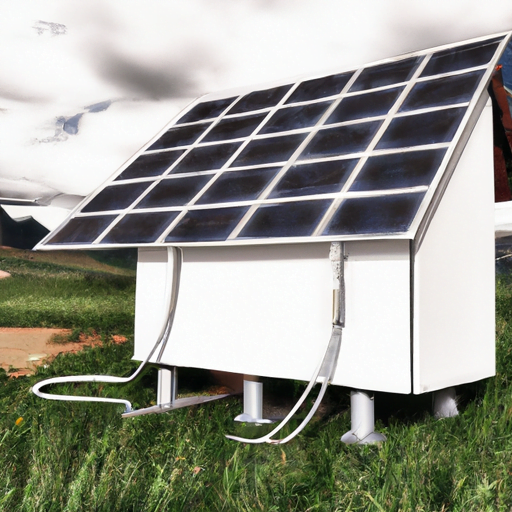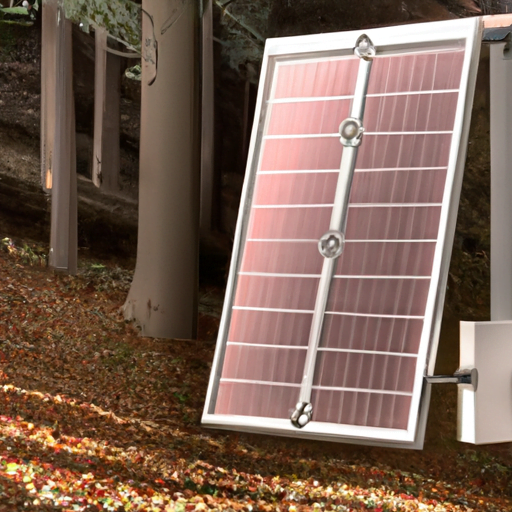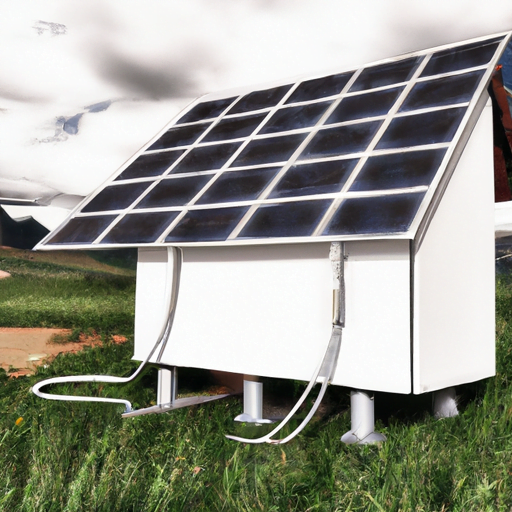So, you’re interested in living off the grid, huh? That’s awesome! It’s definitely a unique lifestyle choice, but one that comes with its fair share of challenges and rewards. One thing you might be wondering is whether a hybrid inverter can be used in an off-grid setup. Well, the answer is yes, it can!
Now, let’s talk a bit about what a hybrid inverter actually is. Basically, it’s a device that combines the functionality of both a grid-tied inverter and a battery-based inverter. This means that it can be used in a variety of different setups, including off-grid systems. In fact, hybrid inverters are becoming increasingly popular among off-grid enthusiasts because of their versatility and efficiency.
In an off-grid setup, a hybrid inverter can help you make the most of your renewable energy sources, such as solar panels or wind turbines. It allows you to convert the DC power generated by these sources into AC power, which can be used to run your appliances and other electrical devices. Additionally, hybrid inverters often have built-in battery chargers, so they can also be used to charge your battery bank and store excess energy for later use.
So, if you’re planning to go off the grid and want to maximize the efficiency of your renewable energy setup, a hybrid inverter could be a great option for you. In the upcoming article, we’ll dive even deeper into the topic and explore the different types of hybrid inverters available, their benefits, and some important considerations to keep in mind when choosing one for your off-grid setup. Stay tuned to learn more!

Introduction
Living off-grid refers to a lifestyle in which individuals or households are not connected to the electricity grid, instead relying on self-generated power sources for their energy needs. In recent years, there has been a growing interest in off-grid setups due to their numerous advantages, such as reduced reliance on fossil fuels and increased energy independence. However, off-grid systems often face challenges related to power management and storage. This is where hybrid inverters come into play.
A hybrid inverter is a device that allows for the integration of multiple energy sources, such as solar panels, wind turbines, and batteries, into a single system. It has the capability to convert and manage the fluctuating energy output from these sources, ensuring a reliable and stable supply of electricity. In this article, we will explore whether or not an off-grid setup can effectively utilize a hybrid inverter and the benefits it can bring to such systems.
Understanding Off-Grid Setup
Living off-grid offers a range of advantages, such as reduced reliance on traditional power sources, increased energy independence, and a smaller carbon footprint. However, it also comes with its fair share of challenges. One of the main challenges of living off-grid is managing power generation and storage. Off-grid setups typically require a combination of renewable energy sources, such as solar panels or wind turbines, and energy storage systems, such as batteries.
Components of an off-grid setup include energy generation sources, energy storage systems, power inverters, charge controllers, and backup generators. These components work together to provide a consistent and reliable source of power.
Introduction to Hybrid Inverters
A hybrid inverter is a combination of a grid-tied inverter and a battery inverter, allowing for the integration of both renewable energy sources and energy storage systems. It acts as a bridge between the energy generation sources and the power storage systems, ensuring a seamless flow of electricity.
The working principle of a hybrid inverter involves converting the DC (direct current) power generated by the renewable energy sources into AC (alternating current) power suitable for household use. It also manages the flow of electricity between the various energy sources and the batteries, charging or discharging them as necessary to maintain a stable power supply.
Key features of hybrid inverters include the ability to automatically switch between different energy sources depending on their availability and efficiency, the ability to store excess energy in batteries for later use, and the ability to supply power to the grid or the household directly.

Can Hybrid Inverters Work Off-Grid?
Traditionally, off-grid setups have relied on standalone inverters or inverter-charger systems to convert and manage the electricity from energy generation sources. However, these setups often face limitations when it comes to managing power fluctuations and ensuring a consistent supply of electricity.
Hybrid inverters can effectively overcome these limitations by providing a more efficient and reliable solution for off-grid setups. By integrating renewable energy sources and energy storage systems, hybrid inverters can ensure a continuous and stable supply of electricity even when the energy generation sources are not producing enough power. This guarantees uninterrupted power for the household or system, regardless of weather conditions or other factors affecting energy generation.
Advantages of Utilizing Hybrid Inverters Off-Grid
The use of hybrid inverters in off-grid setups offers several advantages:
Increased Energy Efficiency
By integrating multiple energy sources, hybrid inverters ensure that every available kilowatt of energy is utilized efficiently. This not only maximizes the use of renewable energy sources but also reduces waste and minimizes reliance on fossil fuels.
Seamless Transition between Grid and Battery Power
One of the key advantages of hybrid inverters is their ability to switch seamlessly between grid power and battery power. This means that during times when renewable energy sources are not generating enough power, the hybrid inverter can automatically draw power from the grid or the batteries to ensure a continuous supply of electricity. This eliminates the need for a backup generator and provides a reliable power supply even during extended periods of low energy generation.
Ability to Utilize Renewable Energy Sources
Hybrid inverters are designed to work with a variety of renewable energy sources, such as solar panels and wind turbines. This means that off-grid setups can take advantage of these abundant and sustainable energy sources to reduce their reliance on traditional power sources. This not only reduces energy costs but also contributes to a greener and more sustainable future.
Reduced Reliance on Fossil Fuels
By utilizing renewable energy sources and integrating energy storage systems, hybrid inverters significantly reduce the need for fossil fuels. This not only helps to protect the environment but also reduces the carbon footprint of off-grid setups. Additionally, reduced reliance on fossil fuels can lead to long-term cost savings as energy prices continue to rise.
Choosing the Right Hybrid Inverter for Off-Grid Setup
When selecting a hybrid inverter for an off-grid setup, there are several factors to consider:
Capacity and Power Output
The capacity and power output of the hybrid inverter should align with the energy needs of the off-grid setup. It is important to consider the peak power demand of the household or system and ensure that the hybrid inverter can handle the load without any issues.
Compatibility with Energy Sources
The hybrid inverter should be compatible with the energy generation sources being used in the off-grid setup. This includes considering the voltage and current requirements of the renewable energy sources, as well as any specific technical requirements they may have.
Battery Storage Capacity
The hybrid inverter should be capable of managing the battery storage capacity effectively. This includes charging and discharging the batteries at the appropriate rates, as well as ensuring that the batteries are not overcharged or discharged.
Expandability and Scalability
The hybrid inverter should allow for future expansion and scalability of the off-grid setup. This means that it should be able to accommodate additional energy generation sources or battery storage systems as the needs of the household or system change over time.
Installation and Maintenance of Hybrid Inverters in Off-Grid Systems
Installing and maintaining hybrid inverters in off-grid systems requires careful consideration and attention to detail. Some key points to keep in mind include:
Pre-Installation Considerations
Before installing a hybrid inverter, it is important to assess the energy needs of the household or system and determine the appropriate capacity and power output requirements. Additionally, consideration should be given to the available space for installation, as well as any regulatory requirements or permits that may be necessary.
Installation Process
The installation process of a hybrid inverter involves connecting the renewable energy sources, battery storage systems, and power distribution panels to the hybrid inverter. Proper wiring and grounding techniques should be followed to ensure safety and efficiency. It is recommended to hire a qualified professional to install the hybrid inverter, as they will have the necessary expertise and knowledge.
Regular Maintenance and Troubleshooting
Regular maintenance of hybrid inverters in off-grid systems is essential to ensure their optimal performance and longevity. This includes regularly inspecting and cleaning the inverters, as well as checking for any signs of damage or wear. Troubleshooting any issues that arise promptly can help prevent larger problems from occurring and ensure a consistent and reliable power supply.
Cost Considerations for Off-Grid Hybrid Inverter Setup
The cost of implementing an off-grid hybrid inverter setup can vary depending on several factors, including the capacity and power output requirements, the number of energy generation sources and batteries needed, and the installation and maintenance costs. It is important to consider both the initial investment costs and the long-term cost savings when evaluating the financial feasibility of such a setup.
Initial Investment Costs
The initial investment costs of an off-grid hybrid inverter setup include the cost of the hybrid inverter itself, as well as the cost of the renewable energy sources, energy storage systems, and any additional equipment or infrastructure needed. It is important to carefully calculate these costs and compare them to the potential savings and benefits of the setup.
Long-Term Cost-Savings
Although the initial investment costs of an off-grid hybrid inverter setup may be higher compared to traditional off-grid systems, the long-term cost savings can be significant. By reducing reliance on fossil fuels and taking advantage of renewable energy sources, the ongoing energy costs can be greatly reduced. Additionally, the ability to generate and store energy can provide a hedge against rising energy prices in the future.
Return on Investment (ROI)
Calculating the return on investment of an off-grid hybrid inverter setup involves considering both the initial investment costs and the potential cost savings over time. This can provide valuable insights into the financial feasibility and viability of the setup, as well as help determine the payback period for the investment.
Case Studies: Off-Grid Setups Utilizing Hybrid Inverters
To further illustrate the benefits and capabilities of off-grid setups utilizing hybrid inverters, let us explore two hypothetical case studies:
Example 1: Residential Off-Grid System
In this case study, a residential off-grid system utilizes a combination of solar panels and wind turbines as energy generation sources, along with battery storage systems and a hybrid inverter. The hybrid inverter seamlessly manages the flow of electricity between the different energy sources and the batteries, ensuring a continuous and stable power supply for the household. The homeowners benefit from increased energy independence, reduced reliance on fossil fuels, and long-term cost savings.
Example 2: Remote Agricultural Off-Grid System
In this case study, a remote agricultural off-grid system utilizes a combination of solar panels and diesel generators as energy generation sources, along with battery storage systems and a hybrid inverter. The hybrid inverter enables the system to make the most efficient use of the renewable energy sources during the day, while relying on the diesel generators during periods of low energy generation. This setup provides a reliable and cost-effective solution for the agricultural needs, reducing operational costs and minimizing the environmental impact.
Conclusion
In conclusion, an off-grid setup can effectively utilize a hybrid inverter to overcome the challenges of power generation and storage. By integrating renewable energy sources and energy storage systems into a single system, hybrid inverters ensure a reliable and stable supply of electricity, even during periods of low energy generation. This brings numerous benefits to off-grid setups, such as increased energy efficiency, seamless transition between grid and battery power, the ability to utilize renewable energy sources, and reduced reliance on fossil fuels. When choosing a hybrid inverter for an off-grid setup, it is important to consider factors such as capacity, compatibility with energy sources, battery storage capacity, and expandability. Proper installation and regular maintenance of hybrid inverters in off-grid systems are essential to ensure optimal performance and longevity. Although the initial investment costs of an off-grid hybrid inverter setup may be higher, the long-term cost savings and return on investment can make it a financially viable and environmentally sustainable choice.




